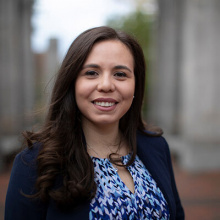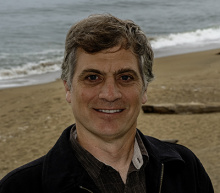CPS Events
Design of Resilient, Engineered, Autonomous, and Multifunctional (DREAM) Structures
Abstract
This talk will discuss strategies for the design of a new generation of intelligent structures equipped with sensors and control devices that can react in real time during multiple hazards. We create these adaptive structures with human-like capabilities by using agent-based modeling, vibration control, and evolutionary game theory. We modified a patented neural dynamic model for seismic design optimization of diagrid buildings, rocking-steel braced frames, and related structural systems. We also investigate integrative design methods to simultaneously design the structure and control devices, optimal placement of sensors, and distribution of tasks during failure mechanisms. We study control methodologies for novel testing technologies such as real-time hybrid simulation that combines numerical and experimental substructures. This unique intersection allows for design studies looking at aerodynamic mitigation through the origami-inspired morphing building envelope, and biomimicry design applying aquatic life adaptations and patterns into urban planning and structural design.
Bio
Mariantonieta Gutierrez Soto, Ph.D., is an assistant professor of Engineering Design at Penn State. She also holds an affiliation in the Dept. of Architectural Engr. and the Dept. of Civil and Environmental Engr. at Penn State. She is the Director of the DREAM Structures Lab. Dr. Gutierrez Soto holds a B.S. in Civil Engr. from Lamar University, Beaumont, Texas, and a M.S. and Ph.D. degree in Civil Engr. with a focus on structures from the Ohio State University under the mentorship of Prof. Hojjat Adeli. She was the recipient of the 2023-2024 Faculty Engagement Award by Penn State’s Teaching and Learning with Technology Center. She also received the “Teacher Who Made a Difference” award in 2020 and the “Faculty Research Mentor of the Week” award in 2019 from the University of Kentucky. She received the Presidential Fellowship in 2016.
From Coordination to Collaboration in Multi-Robot Systems: Lessons from Ecology
Abstract
A standard approach to multi-robot systems is to divide the team-level tasks into suitable building blocks and have the robots solve their respective subtasks in a coordinated manner. However, by bringing together robots of different types, it should be possible to arrive at completely new capabilities and skill-sets. In other words, the whole could become greater than the sum of its parts. Inspired by the ecological concept of a mutualism, i.e. the interaction between two or more species that benefit everyone involved, this idea is formalized through the composition of barrier functions for encoding collaborative arrangements in terms of expansions and contractions of relevant sets. Contextualized in a long-duration setting for robots deployed over long time scales, where optimality has to take a backseat to “survivability”, example scenarios include robotic environmental monitoring, safe learning, and remote access in the Robotarium, which is a multi-robot lab that has been in (almost) continuous operation for over five years.
Bio
Dr. Magnus Egerstedt is the Dean of Engineering and a Professor in the Department of Electrical Engineering and Computer Science at the University of California, Irvine. Prior to joining UCI, Egerstedt was on the faculty at the Georgia Institute of Technology, serving as the Chair in the School of Electrical and Computer Engineering and the Director for Georgia Tech's Institute for Robotics and Intelligent Machines. He received the M.S. degree in Engineering Physics and the Ph.D. degree in Applied Mathematics from the Royal Institute of Technology, Stockholm, Sweden, the B.A. degree in Philosophy from Stockholm University, and was a Postdoctoral Scholar at Harvard University. Dr. Egerstedt conducts research in the areas of control theory and robotics, with particular focus on control and coordination of multi-robot systems. Magnus Egerstedt is a Fellow of IEEE and IFAC, a member of the Royal Swedish Academy of Engineering Science, and served as President of the IEEE Control Systems Society. He has received a number of teaching and research awards, including the Ragazzini Award, the O. Hugo Schuck Best Paper Award, and the Alumni of the Year Award from the Royal Institute of Technology.
Embodied Intelligence in Bionic Limbs
Abstract
Recent developments in the design of bionic limbs increasingly emphasize the importance of human-centered principles in creating intelligent systems that can operate seamlessly within complex, dynamic environments and interact naturally with users. This talk explores the challenges of achieving embodied intelligence in lower-limb prostheses, and presents results in key methodologies, including compliant actuator design and AI-based control architectures. These innovations not only have the potential to enhance the functionality of the prosthesis but also to significantly improve the intuitiveness of the user experience and, ultimately, to improve their quality of life.
Bio
Raffaella Carloni is an Associate Professor in the Department of Artificial Intelligence, Faculty of Science and Engineering, University of Groningen, The Netherlands, where she directs the Robotics Laboratory and serves as the chair of the Human-centered Robotics group. She received the B.Sc./M.Sc. degrees in Electronic Engineering from the University of Bologna, Italy, in 2002, and the Ph.D. degree from the Department of Electronics, Computer Science and Systems, University of Bologna in 2007. She was Assistant/Associate Professor at the University of Twente, Enschede, The Netherlands, from 2008 to 2017.
Energy Harvesting and Autonomous Underwater Vehicle Docking to Power a Persistent Presence of Oceanographic Instrumentation
Abstract
The Monterey Bay Aquarium Research Institute (MBARI) includes a focus on expanding a persistent presence of oceanographic instrumentation in the ocean. Projects include vehicle development and reliability, instrumentation development, autonomy, techniques for environmental energy harvesting, and autonomous vehicle docking for energy transfer. This talk will outline recent efforts to develop and field a small wave-energy harvesting device, and new docking techniques for the MBARI long-range autonomous underwater vehicle platform. A description of these efforts, results from recent deployments, an outline of the scientific explorations currently being supported, and possible collaborative opportunities will be presented.
Bio
Andrew Hamilton has served as the engineering division chair at the Monterey Bay Aquarium Research Institute (MBARI) in Moss Landing, CA since 2020, and has been a mechanical engineer at MBARI since 2002. He completed a B.S in Mechanical Engineering at the University of Colorado in 1991, and a PhD in Mechanical Engineering at the University of California, Berkeley in 2001. Andrew's engineering and research interests include energy harvesting for powering autonomous systems, deep-water mooring design, hydrodynamics of underwater vehicles, underwater vehicle docking, embedded systems, power electronics, and control systems.
Bracing for Interference: Electronic Warfare and its Spillover Effects
Abstract
Electronic warfare (EW) has historically been a highly classified topic. But its recent spillover effects on civil systems far from any battlefield demand more open discussion and research on the topic.
In response to the alarming recent uptick in GPS jamming and spoofing, and the dangers this poses for civil aviation, the ITU World Radio Conference passed a resolution in December 2023 to emphasize the protected status of the so-called RNSS bands in which GPS signals are transmitted. But it was not possible to get agreement on the resolution without introduction of an caveat that, ironically, weakens protections of these bands. This caveat states that UN member states have a right to deny access to GNSS signals for security or defense purposes. One may conclude from this that GNSS interference is here to stay: Any country claiming a defensive purpose can jam or spoof GNSS with impunity.
This presentation examines electronic warfare from an academic perspective, noting trends and technologies that are disrupting its practice and widening its effects.
Speaker Bio
Todd E. Humphreys (B.S., M.S., Utah State University; Ph.D., Cornell University) holds the Ashley H. Priddy Centennial Professorship in Engineering in the department of Aerospace Engineering and Engineering Mechanics at the University of Texas at Austin. He is Director of the Wireless Networking and Communications Group and of the UT Radionavigation Laboratory, where he specializes in the application of optimal detection and estimation techniques to positioning, navigation, and timing. His awards include the UT Regents' Outstanding Teaching Award (2012), the NSF CAREER Award (2015), the ION Thurlow Award (2015), the PECASE (NSF, 2019), the IEEE Walter Fried Best Paper Award (2012, 2020, 2023), and the ION Kepler Award (2023). He is a Fellow of the Institute of Navigation and of the Royal Institute of Navigation.






